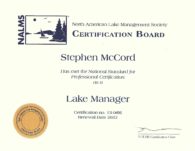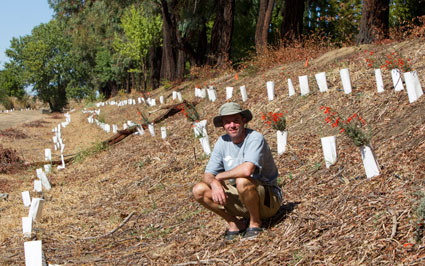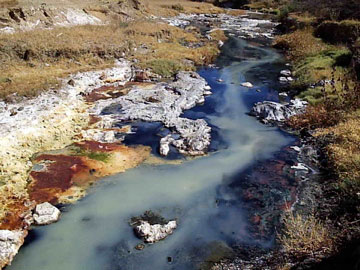➢ LAKE & WATERSHED MANAGEMENT STRATEGIES
MEI serves stakeholders developing and implementing lake and watershed management programs to:

- Identify and evaluate pollutant control alternatives
- Review, comment on, and negotiate TMDL allocations and implementation plans
- Design and implement technical studies and pollutant control projects
- Characterize manageable lake hydrodynamic and water quality processes
- Pine Mountain Lake Management Developing a comprehensive lake management plan with standard operating procedures for dam safety monitoring, water rights reporting, and lake water quality management activities. Write outreach articles. Troubleshoot issues such as swallow and geese invasions, and pathogen indicator monitoring. View the Pine Mountain Lake Association website.
- Loch Lomond Management Plan Produced first lake management plan. Developed and applied lake water quality simulation model to evaluate alternative intake structures and climate change scenarios. Designed hypolimnetic oxygenation system. View the Loch Lomond Recreation Area website.
- Yolo Bypass Water Quality Management Plan Led field crews and analyzed the resulting extensive water and sediment quality data set generated by the Yolo Bypass monitoring program, including chemistry and toxicity testing data collected from numerous surface water monitoring sites monthly over a one-year period. View presentation for 2006 CALFED Science Conference.
- Lake Nakuru Hydrologic Analysis Worked with local partners to compile relevant data, and then developed and calibrated a water balance model of Lake Nakuru in the Rift Valley of Kenya. The model is used to quantify minimum inflows needed to maintain an adequate water level in the lake for environmental benefits. View Research Brief.
➢ TECHNICAL PROJECT MANAGEMENT
MEI provides technical project management services, engaging multiple technical experts to address complex water quality projects. Organizational, inter-personal, and project management skills are devoted to leading sophisticated stakeholder-driven processes to accomplish specific technical tasks and complete complicated watershed and regionally based projects on schedule and within budget.
 Reference projects include:
Reference projects include:- Trail Restoration and Dam Stabilization at Knoxville Management Area Managed a two-year project to improve off-highway vehicle trails for erosion control on Bureau of Land Management property and to stabilize a failed earthen dam on the adjacent UC Davis McLaughlin Reserve. View the project web page.
- Corona and Twin Peaks Mercury Mines Cleanup Project Managing a novel project using public funds through a non-profit Good Samaritan to address landscape and discharge contamination for public benefits. The project will be completed in early 2015. View the project website.
- Brownfields Coalition Assessment Project As Project Manager of the Westside Sac IRWM Brownfields project, Dr. McCord is leading a team in the prioritization of approximately 80 abandoned mine lands in the Cache Creek and Putah Creek watersheds. Under the EPA Brownfields Assessment Program, the team is working with local community leaders and experts to identify, assess, and prioritize sites for remediation efforts based on potential impact to the environment and potential benefit for alternative land use.
- North Davis Riparian Greenbelt Urban Greening Project Project manager for a diverse team of non-profits, researchers, Resource Conservation District staff, city staff, and dedicated volunteers to “green” a stormwater channel in north Davis and create educational areas to learn about native plants and sustainable landscape management. Funded by the Strategic Growth Council’s Urban Greening Program via Proposition 84.
➢ STAKEHOLDER GROUP FACILITATION & TECHNICAL SUPPORT
MEI provides facilitation and technical support services for stakeholder groups, work groups and other professional organizations.
 Reference projects include:
Reference projects include:- Delta Tributaries Mercury Council–Provided technical support (2001-2007) and facilitation (2008-2023) services to the 400-person Council addressing mercury issues in the Central Valley; developed and track a strategic plan, host quarterly meetings, and provide periodic mercury news updates. View the DTMC page.
- Delta Regional Monitoring Program–Chaired Technical Advisory Committee to provide technical input and oversight to the program.
- SRWP Monitoring Committee and Regional Monitoring Program Feasibility Study–Led the Monitoring Committee to investigate the feasibility of developing a regional monitoring program for the Sacramento River Watershed. Hosted workshops, created a flier, and wrote the study report. View the SRWP Website.
- Nonpoint Sources Workgroup–Facilitated 150-member group of wetland and irrigated agricultural land managers in the Sacramento-San Joaquin Rivers Delta to address methylmercury control study requirements. View journal article synthesizing potential management practices
➢ WATER & SEDIMENT QUALITY MONITORING
MEI develops and manages large- or small-scale monitoring and assessment projects involving analyses of water and sediment chemistry, aquatic and sediment toxicity testing, and various other physical and biological parameters. For field work, Dr. McCord is certified in Wilderness First Aid, CPR, and epinephrine administration. Specific tasks may include:
- Monitoring influent and effluent to evaluate water treatment performance
- Measuring dilution and mixing of a discharge into its receiving water
- Conducting tracer studies
- Specifying, deploying, and tracking continuous water quality sensors
- Training and leading staff in clean sampling techniques (view Clean Water Act Analytical Methods)
- New Development Stormwater Monitoring, City of Elk Grove Deployed continuous sensors, solicited and managed volunteers, tracked and triggered storm runoff monitoring events, and tested sediment and water column toxicity. Reported results of baseline monitoring and developed a long-term monitoring strategy. View Elk Grove study final report.
- Structural Best Management Practices evaluation Monitored runoff from an urbanized area to evaluate pollutant removal effectiveness in the City of Sacramento. View City of Sacramento swale special study final report.
- Wastewater Tracer Studies Led dye tracer studies to confirm analytical mixing solutions, and applied numerical model CORMIX to delineate effluent mixing zones in the Los Angeles, Napa and Russian rivers.
- Continuous Sensor Deployments Managed multiple projects constructing and deploying custom-made continuous sensors in effluent and in tidally-influenced rivers. Interpreted results to quantify dilution, transport, reaction kinetics, and diurnal patterns.
